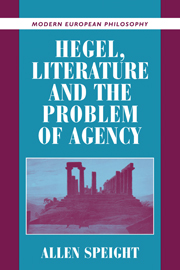Book contents
- Frontmatter
- Contents
- Acknowledgments
- Introduction
- 1 “Hegel's Novel”: The Phenomenology of Spirit and the Problem of Philosophical Narrative
- 2 Tragedy and Retrospectivity: Hegel's Antigone
- 3 Comedy and Theatricality: Desire, Bildung, and the Sociality of Agents' Self-Knowledge
- 4 Forgiveness and the Romantic Novel: Contesting the Beautiful Soul
- 5 From the Phenomenology to the Philosophy of Right: Hegel's Concept of the Will and the Possibility of Modern Ethical Life
- Selected Bibliography
- Index
4 - Forgiveness and the Romantic Novel: Contesting the Beautiful Soul
Published online by Cambridge University Press: 18 November 2009
- Frontmatter
- Contents
- Acknowledgments
- Introduction
- 1 “Hegel's Novel”: The Phenomenology of Spirit and the Problem of Philosophical Narrative
- 2 Tragedy and Retrospectivity: Hegel's Antigone
- 3 Comedy and Theatricality: Desire, Bildung, and the Sociality of Agents' Self-Knowledge
- 4 Forgiveness and the Romantic Novel: Contesting the Beautiful Soul
- 5 From the Phenomenology to the Philosophy of Right: Hegel's Concept of the Will and the Possibility of Modern Ethical Life
- Selected Bibliography
- Index
Summary
Novels are the Socratic dialogues of our time.
F. Schlegel, Critical Fragments #26In the previous two chapters, we have shown how two important elements of Hegel's concept of agency – what we have termed “retrospectivity” and “theatricality” – derive their particular force from a consideration, respectively, of tragedy and comedy. The Phenomenology's task is to show how both of these two moments of agency require recognitive, interpretive structures capable of integrating first- and third-person perspectives of agency. In each case, the PhG is deeply guided by a reading of specific tragic and comic works, as in the appropriation of Antigone and Rameau's Nephew in the first two main sections of the “Spirit” chapter.
The explorations of both retrospectivity and theatricality have left further questions for our account of agency: Do unintended consequences just leave an agent – as the “tragic” experience of action suggests – with the need to accept a case-by-case determination of what must be regarded as “sticking” to the action for which he is responsible? Is the spectator/spectacle split between the agent who acts in the (external) world and the (internal) judge of that action always present, as the “comic” experience of action suggests? The historical situations of tragedy and comedy that Hegel has probed in the “Spirit” chapter – that of the tragic hero's relation to fate and the comic hero's awareness of the maskedness of all action – left little in the way of resolutions for viable modern agency: neither the tragic agent's amor fati nor the fractured sense of a divided self which afflicts the comic agent seems to hold possibilities for a genuinely free and rational agent who can in some sense “return” to himself from out of these tragic and comic moments of his agency.
- Type
- Chapter
- Information
- Hegel, Literature, and the Problem of Agency , pp. 94 - 121Publisher: Cambridge University PressPrint publication year: 2001



